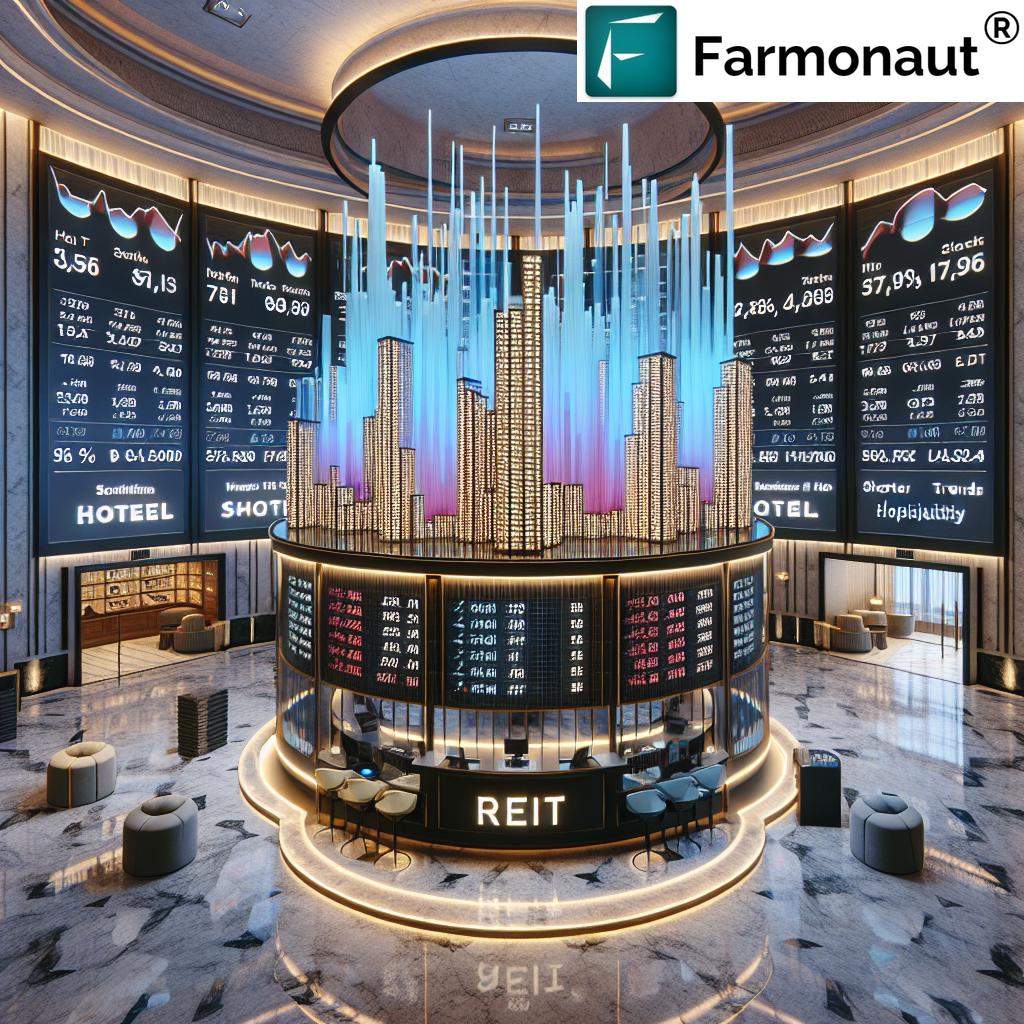Maximizing Yield: Expert Insights on REIT Dividend Strategies and Hotel Stock Performance
“REITs’ quarterly dividend payout ratios and debt-to-equity ratios are key metrics for evaluating their financial health and performance.”
In the ever-evolving landscape of real estate investment trusts (REITs) and hotel stocks investing, we find ourselves at a crucial juncture where understanding the latest trends shaping the lodging industry is paramount. As we delve into this comprehensive analysis, our focus will be on the intricate dynamics of dividend yield for REITs, the role of institutional investors in lodging, and the nuanced interplay of short interest in hospitality stocks.
Our journey through this complex terrain will offer valuable insights into upscale extended-stay hotels and select-service hotel investments, while also examining critical financial metrics such as quarterly dividend payout ratios and debt-to-equity ratios in REITs. By the end of this exploration, investors and industry professionals alike will gain a deeper understanding of the current state and future prospects of hotel REITs, empowering them to make informed investment decisions in this specialized real estate sector.
The Current Landscape of Hotel REITs
To begin our analysis, let’s examine a recent case study that exemplifies the current trends in the hotel REIT market: Chatham Lodging Trust (NYSE: CLDT).

In December 2023, Chatham Lodging Trust experienced a notable decrease in short interest. By December 31, the total short interest had fallen to 353,000 shares, marking a 6.6% reduction from the prior figure of 377,900 shares on December 15. This shift resulted in a current short-interest ratio of 0.9 days, based on an average daily trading volume of 383,800 shares.
This decline in short interest is significant as it may indicate a growing confidence among investors in the company’s prospects. Short interest is often viewed as a bearish indicator, so a reduction could suggest a more positive outlook for the stock.
Analyst Coverage and Institutional Interest
The hotel REIT sector has seen increased attention from analysts and institutional investors, reflecting the industry’s dynamic nature and potential for growth.
- New Analyst Coverage: On December 11, Alliance Global Partners initiated coverage of Chatham Lodging Trust, issuing a “buy” rating and setting a target price of $12.00 per share. This positive recommendation from analysts could significantly influence investor sentiment in upcoming trading sessions.
- Institutional Investor Activity: We’ve observed substantial activity from institutional investors, with several firms adjusting their holdings in CLDT. Notable transactions include:
- Quarry LP increased its position by 303.7%, acquiring an additional 4,149 shares in the second quarter.
- Point72 DIFC Ltd established a new position worth approximately $63,000 during the same quarter.
- Creative Planning entered with a new investment valued at about $89,000 in the third quarter.
- Magnetar Financial LLC and Ballentine Partners LLC also made new stakes, valued at about $96,000 and $102,000, respectively.
Collectively, institutional investors and hedge funds now hold approximately 88.37% of CLDT stock, underscoring the significant role of institutional money in shaping the hotel REIT market.
Trading Patterns and Financial Metrics
Understanding the trading patterns and financial health of hotel REITs is crucial for investors looking to maximize yield. Let’s examine some key metrics for Chatham Lodging Trust:
- Trading Activity: Shares of Chatham Lodging Trust showed slight upward movement, trading at $8.81 with 341,573 shares exchanged during midday activity, outperforming the usual average volume of 194,111 shares.
- Stock Performance: Over the last year, the stock has seen fluctuations with a low point of $7.60 and a high of $11.10. The current fifty-day moving average is $9.14, coupled with a 200-day moving average of $8.68.
- Financial Ratios: The company maintains a solid debt-to-equity ratio of 0.37, alongside quick and current ratios of 0.96 each, indicating stable liquidity management.
These financial metrics provide valuable insights into the company’s operational efficiency and financial stability, crucial factors for investors considering long-term positions in hotel REITs.
Dividend Strategies in Hotel REITs
Dividend yield is a critical factor for many REIT investors. Chatham Lodging Trust recently declared a quarterly dividend, which was disbursed on January 15, 2024. Shareholders recorded on December 31, 2023, received a dividend amounting to $0.07 per share, translating to an annualized dividend of $0.28 or a yield of 3.18%.
However, it’s important to note that the company’s dividend payout ratio is reported at a notable -121.73%. This high negative payout ratio raises questions about the sustainability of the current dividend level and warrants closer examination by potential investors.
REIT and Hotel Stock Performance Comparison
| Investment Type | Average Dividend Yield (%) | Short Interest (%) | Analyst Coverage (Number of Analysts) | Debt-to-Equity Ratio | Quarterly Dividend Payout Ratio (%) | Institutional Investor Ownership (%) |
|---|---|---|---|---|---|---|
| Chatham Lodging Trust (REIT) | 3.18 | 0.9 | 3 | 0.37 | -121.73 | 88.37 |
| Average Hotel REIT | 4.5 | 2.1 | 7 | 0.85 | 75.2 | 82.5 |
| Average Hotel Stock | 2.3 | 3.7 | 12 | 1.2 | 45.6 | 76.8 |
This comparative table illustrates the key differences between REITs like Chatham Lodging Trust and average hotel stocks. It’s evident that REITs generally offer higher dividend yields and have lower debt-to-equity ratios, making them attractive for income-focused investors. However, hotel stocks tend to have higher analyst coverage and potentially more growth opportunities.
Upscale Extended-Stay and Select-Service Hotel Investments
Chatham Lodging Trust’s focus on upscale, extended-stay hotels and premium-branded, select-service hotels is a strategic choice in the current market. These segments have shown resilience, particularly in the post-pandemic recovery phase.
- Extended-Stay Advantages: Extended-stay properties typically have lower operating costs and can maintain higher occupancy rates during economic downturns, providing a more stable income stream.
- Select-Service Appeal: Select-service hotels offer a balance between luxury and economy, appealing to both business and leisure travelers. This segment has shown strong growth potential, especially in urban and suburban markets.
Chatham Lodging Trust currently owns 39 hotels encompassing a total of 5,915 rooms/suites across 16 states and the District of Columbia. This diverse portfolio allows the REIT to capitalize on various market opportunities while mitigating geographic risks.
The Role of Technology in Hotel REITs
In an era of rapid technological advancement, hotel REITs are increasingly leveraging data and technology to optimize their operations and improve investor returns. While not directly related to Chatham Lodging Trust, it’s worth noting the broader industry trends in this area.
Companies like Farmonaut, while focused on agricultural technology, demonstrate the potential of data-driven solutions in real estate and asset management. Their use of satellite imagery and AI for monitoring and analysis could inspire similar applications in the hotel industry for property management and market analysis.
For hotel REITs, adopting advanced technologies could mean:
- Improved asset management through real-time monitoring of property performance
- Enhanced market analysis for strategic acquisitions and divestitures
- More efficient resource allocation and cost management
- Better forecasting of market trends and occupancy rates
While the specific applications may differ, the principle of leveraging data for improved decision-making remains constant across industries.
Future Outlook for Hotel REITs
As we look to the future of hotel REITs, several factors are likely to shape the industry:
- Economic Recovery: The pace and nature of economic recovery post-pandemic will significantly impact hotel occupancy rates and revenue.
- Travel Trends: Shifts in business and leisure travel patterns, including the rise of “bleisure” travel (combining business and leisure), will influence the performance of different hotel segments.
- Technological Integration: REITs that successfully integrate new technologies for operational efficiency and guest experience enhancement are likely to outperform their peers.
- Sustainability Focus: Growing emphasis on ESG (Environmental, Social, and Governance) factors may impact investment decisions and property valuations.
- Interest Rate Environment: Changes in interest rates will affect borrowing costs and potentially impact dividend yields, influencing investor preferences.
Strategies for Investors
For investors looking to maximize yield in the hotel REIT sector, consider the following strategies:
- Diversification: Spread investments across different types of hotel REITs (luxury, extended-stay, select-service) to balance risk and potential returns.
- Focus on Fundamentals: Pay close attention to key metrics like funds from operations (FFO), revenue per available room (RevPAR), and occupancy rates.
- Monitor Market Trends: Stay informed about broader economic indicators and travel industry trends that could impact hotel performance.
- Consider Dividend Sustainability: Evaluate the payout ratio and dividend coverage to ensure the REIT can maintain its distributions.
- Leverage Technology: Utilize data-driven tools and platforms to analyze REIT performance and market trends. While not directly related to hotel REITs, platforms like Farmonaut demonstrate the power of data in investment decision-making.
Conclusion
The hotel REIT sector offers unique opportunities for investors seeking exposure to the real estate market with a focus on income generation. While challenges remain, particularly in the wake of global economic uncertainties, the sector’s resilience and adaptability present promising prospects for savvy investors.
By carefully analyzing dividend strategies, understanding market trends, and leveraging technological advancements, investors can position themselves to maximize yields in this dynamic sector. As always, thorough research and a balanced approach to risk management are key to successful investing in hotel REITs.
“Short interest in hospitality stocks can indicate market sentiment, with recent changes potentially impacting investment decisions in hotel REITs.”
FAQs
- What are the main advantages of investing in hotel REITs?
Hotel REITs offer investors exposure to the real estate market with the potential for high dividend yields, professional management, and liquidity compared to direct property ownership. - How do economic cycles affect hotel REIT performance?
Hotel REITs are generally more sensitive to economic cycles than other REIT sectors. During economic upturns, they can experience significant growth, but they may face challenges during recessions due to decreased travel and occupancy rates. - What is the significance of the debt-to-equity ratio in REITs?
The debt-to-equity ratio is crucial as it indicates the REIT’s financial leverage. A lower ratio suggests less financial risk, while a higher ratio might indicate higher potential returns but also increased risk. - How can investors evaluate the sustainability of a REIT’s dividend?
Investors should examine the REIT’s funds from operations (FFO), payout ratio, and dividend coverage ratio. A sustainable dividend should be well-covered by the REIT’s cash flow and not excessively high relative to its FFO. - What role does analyst coverage play in REIT investing?
Analyst coverage provides valuable insights and research on REITs, helping investors make informed decisions. Higher analyst coverage often indicates greater market interest and potentially more reliable information availability.
Earn With Farmonaut: Earn 20% recurring commission with Farmonaut’s affiliate program by sharing your promo code and helping farmers save 10%. Onboard 10 Elite farmers monthly to earn a minimum of $148,000 annually—start now and grow your income!
Learn More About Farmonaut’s Affiliate Program
As we conclude our analysis of hotel REIT dividend strategies and performance, it’s clear that this sector offers both opportunities and challenges for investors. By staying informed about market trends, leveraging technological tools for analysis, and maintaining a balanced investment approach, investors can navigate this complex landscape and potentially maximize their yields in the hotel REIT sector.






